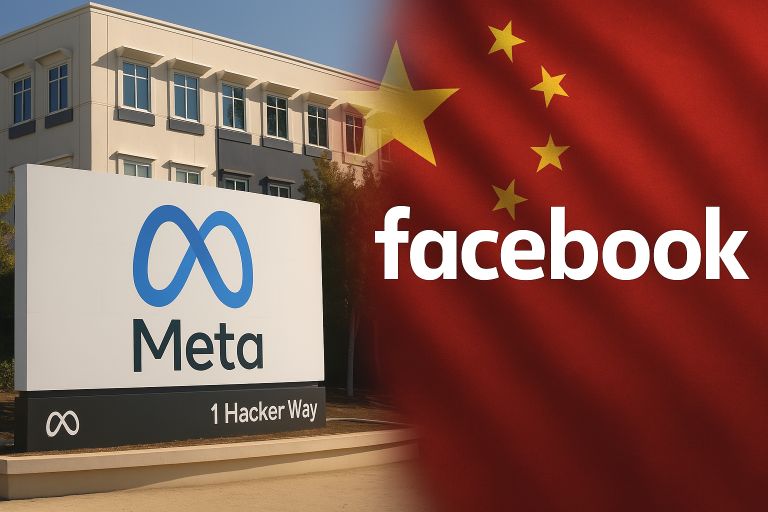While American lawmakers debated Section 230 and teen safety, Meta was allegedly engaged in censorship-related cooperation with the Chinese Communist Party — a development that raises serious questions about Meta, China, and censorship.
In a Senate Judiciary Committee hearing on April 10, 2025, former Facebook executive and whistleblower Sarah Win Williams delivered what can only be described as a bombshell: Meta (formerly Facebook) not only pursued business in China — it allegedly helped the CCP censor, surveil, and control information, including content from users in the United States.
Let that sink in
A U.S.-based company. Handing over censorship tools. Helping an authoritarian regime silence political speech. Including speech on American soil.
“Mark Zuckerberg worked hand-in-glove with the Chinese Communist Party,” Williams testified.
“They developed censorship tools at China’s request. They removed dissidents. They offered data. They briefed Chinese officials on artificial intelligence.”
And for what? Market access. Profit. Influence. Power.
This isn’t just a corporate ethics scandal. It’s a question of national sovereignty, civil liberties, and the unchecked global power of Big Tech.
What Facebook/Meta Allegedly Did for China
- Built censorship tools to silence political content and dissident voices, customized for China’s information control system.
- Gave Chinese Communist Party officials access to internal Facebook engineering teams — including briefings on AI and surveillance-related technologies.
- Offered to store user data in China, under Chinese jurisdiction, despite knowing this could expose private information to Beijing’s intelligence apparatus.
- Discussed routing traffic through Chinese infrastructure that could capture messages, metadata, and personal info — including from American users.
- Shut down the Facebook account of Chinese dissident Guo Wengui, a U.S. resident, at the request of the Chinese government.
- Told Congress it had “no operations in China,” while internal documents show an $18 billion strategy codenamed Project Uldren, aimed at breaking into the Chinese market.
- Installed censorship mechanisms in Hong Kong and Taiwan, giving the CCP real-time influence over which posts went viral.
- Allowed Chinese officials to test and fine-tune those censorship systems.
- Delivered internal artificial intelligence models — including the LLaMA framework — that are now reportedly powering Chinese military-linked AI systems, like DeepSeek.
- Sued whistleblower Sarah Win Williams and sought a gag order against her — demanding $50,000 for every public mention of Facebook, even when truthful.
These allegations aren’t speculation. They’re backed by documents, meeting notes, emails, chat logs, and sworn congressional testimony.
Censoring China’s Enemies — in America
One of the most disturbing revelations centers on Guo Wengui, a Chinese dissident and political exile residing in the U.S. According to Williams, Chinese officials pressured Facebook to remove his page — and Facebook complied.
“He was living on American soil. He had every right to speak,” Williams said.
“Facebook silenced him to please Beijing.”
Documents shown during the hearing reveal Facebook executives strategizing how to “respond to Chinese demands” and discussing “ways to demonstrate we can address mutual interests” — in other words, how to prove Facebook could be useful to the regime.
Let’s be clear: this is not about content moderation. This is about a U.S. corporation enforcing the rules of a foreign dictatorship — against a voice protected under the U.S. Constitution.
AI, Surveillance, and the Meta China Censorship Pipeline
It doesn’t end with censorship.
Williams also testified that Meta’s AI model, LLaMA, was made available to Chinese researchers — and is now reportedly being used to train advanced Chinese AI systems, including DeepSeek, which has direct military and surveillance applications.
“Facebook offered briefings to the CCP on how to build more efficient AI systems, how to scale compute infrastructure, how to train facial recognition,” she said.
“They explicitly stated their goal was to help China ‘out-compete U.S. firms.’”
See also: F-35 Cancellation — Economic Risks & the Gripen Alternative for Canada, which analyzes another major Canadian policy decision with deep economic implications and long-term strategic trade-offs.
Now imagine what else we haven’t been told
Meta — an American company — allegedly offered technical assistance that could help the Chinese regime beat the United States in one of the most strategically important technologies of our time.
At a moment when Congress is debating AI safety and national competitiveness, Meta may have already given the edge away.
And the exposure wasn’t limited to Americans. According to the whistleblower, Meta’s proposed infrastructure in China — including plans for Chinese-based servers and data routes — would not only store Chinese user data, but also commingle it with foreign data, including from the U.S., Canada, and beyond. “You can’t segregate the data,” Williams explained. “It would have American data, Chinese user data — and it would be on Chinese soil.” If you’ve ever messaged a contact in China, commented on a viral post from Hong Kong, or interacted with cross-border content, your data may have been routed through systems accessible to the CCP.
The scope of the Meta China censorship scandal continues to unfold, with far-reaching implications for global tech accountability.
National Security Violations? Privacy Breaches? Perjury?
The list of potential violations is staggering.
- Lying to Congress? Meta repeatedly told lawmakers it had “no operations in China.” That now appears false.
- FTC Consent Order violations? Facebook has been under a federal privacy agreement since 2012, barring it from misleading users about data handling. Storing or exposing American user data abroad — without disclosure — could trigger serious consequences.
- Export control violations? Sharing AI tech with military-linked foreign entities is regulated under U.S. law.
- Whistleblower retaliation? Meta is suing Williams for telling the truth and allegedly using the legal system to silence her. They’ve secured a gag order so extreme it could make her financially liable for what members of Congress say.
Even Zuckerberg’s defenders should ask: Why the fear? Why the secrecy? What is Meta trying to hide?
Related: F-35 Cancellation: Canada’s Aerospace Impact
Where Is the Outrage?
This isn’t about regulation anymore. This is about foreign influence, censorship, and the erosion of American sovereignty by a private company.
Meta didn’t just try to do business in China. According to this testimony, they helped China do business in us.
- They helped China suppress dissent.
- They helped China access American data.
- They helped China build AI.
- And they allegedly did all of it in secret — until someone spoke up.
Williams risked everything to tell this story. The question now is: Will Congress act, or will this disappear like so many scandals before it?
What Happens Next
Mark Zuckerberg has yet to appear before Congress to address these specific allegations. Meta has not issued a full public response. Lawmakers say investigations are underway. But one thing is clear:
This is not a minor policy debate. This is a national reckoning — and the public deserves answers.
We’ll be following up.
What do you make of this? Share your thoughts in the comments below.
For full details, please refer to our Disclaimer page.

